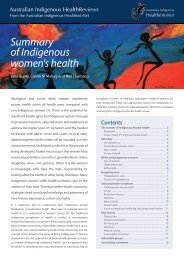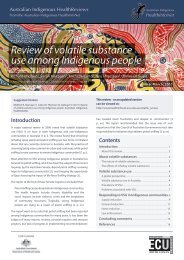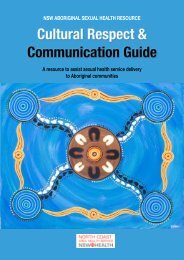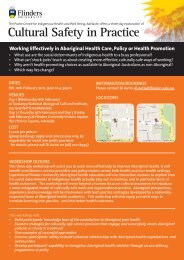hearing loss and the criminal justice system - Australian Indigenous ...
hearing loss and the criminal justice system - Australian Indigenous ...
hearing loss and the criminal justice system - Australian Indigenous ...
You also want an ePaper? Increase the reach of your titles
YUMPU automatically turns print PDFs into web optimized ePapers that Google loves.
<strong>the</strong>m. NAAJA would strongly urge <strong>the</strong> training of sign interpreters in <strong>the</strong> variousspoken Aboriginal languages in <strong>the</strong> Nor<strong>the</strong>rn Territory to address this issue. Thisservice could be aligned to <strong>the</strong> Aboriginal Interpreter Service <strong>and</strong> could be called atshort notice <strong>and</strong> on an as needs basis.2.5 Conclusion: A Case StudyThe consequences of not properly addressing <strong>hearing</strong> impairment issues facingAboriginal defendants in <strong>the</strong> <strong>criminal</strong> <strong>justice</strong> <strong>system</strong> can be devastating. The casestudy below demonstrates <strong>the</strong> sprialling consequences that can occur:Case Study - NN is charged with several serious driving offences, including driving undersuspension. He is deaf, <strong>and</strong> does not know sign language. N has significant difficultiesexplaining himself <strong>and</strong> will often nod during conversations, which leads to people tobelieve he is replying ‘yes’, when, in fact, he does not underst<strong>and</strong>. He has a verylimited <strong>and</strong> idiosyncratic form of sign language. Every now <strong>and</strong> <strong>the</strong>n he doessomething that resembles signing.N is not able to communicate with his lawyer. An AUSLAN interpreter has beenutilised, but because N cannot sign, he is not able to convey instructions to his lawyerof any complexity. N’s lawyer sought to arrange a Warlpiri finger talker through <strong>the</strong>Aboriginal Interpreter Service, but <strong>the</strong> interpreter concerned was not willing or able tocome to court. It was also not known if N would even be able to communicate usingWarlpiri finger talking.The witness statements disclosed to defence included a statement from a police officerdescribing how she came upon a group of men drinking in a park drinking. She ran acheck on N, to discover he had warrants for his arrest, at which time she arrested him.Her statement reads: "It is my belief that he understood as he looked at me <strong>and</strong>became quite distressed. I asked (N) verbally if he understood <strong>and</strong> he nodded <strong>and</strong>turned his head away from me while raising his arms in <strong>the</strong> air."N is currently on bail, but has spent significant periods on rem<strong>and</strong> at DarwinCorrectional Centre. His charges are yet to be finally determined, <strong>and</strong> an applicationfor a stay of proceedings is pending. N is effectively trapped in <strong>the</strong> <strong>criminal</strong> <strong>justice</strong><strong>system</strong>. He cannot plead guilty or not guilty because he is not able to communicatewith his lawyer <strong>and</strong> provide instructions.He had previously been granted bail, but after failing to attend court as required, hisbail was revoked. Significantly, his inability to convey information (or to underst<strong>and</strong>what his lawyer was trying to tell him) in relation to his charges has also been highlyproblematic in relation to bail.For example, when he was explaining to his lawyer with <strong>the</strong> assistance of <strong>the</strong>AUSLAN interpreter when he was to reside, both <strong>the</strong> interpreter <strong>and</strong> lawyerunderstood N to be referring to a particular community. It was only when <strong>the</strong>8








